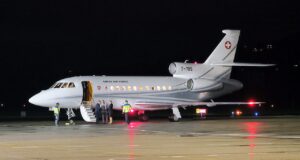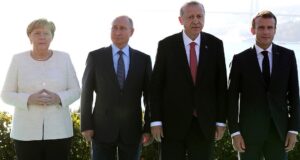Guest Contributor: Dr James D. Boys
25th August 2013
During his all too brief time as president, John F. Kennedy was understood to have lamented the difficulty he faced in making the threat of American power credible. ‘The place to do so,’ he speculated, ‘is in Vietnam.’ Whether JFK would have escalated the war as LBJ did is impossible to know. What is all too apparent is that President Obama faces a similar dilemma today in regard to US credibility due to events in Syria.
US prevarication over Syria has raised a series of questions regarding the potential decline of US global influence and in relation to the general competence of the Obama administration. Many of these questions are appropriate, but let us consider for a moment the position of the White House.
The Obama administration came to power on the basis that it was not George W. Bush. Now safely into his second term, Barack Obama does not wish to perpetuate any suggestion that he is merely continuing previous policies, despite the many suggestions to this effect.
The world had grown accustomed to George W. Bush’s cowboy style and rhetoric, even if it didn’t necessarily approve. By way of contrast, Barack Obama’s cool and detached demeanour appears all the more distinct and withdrawn from the passions of the moment and presents the impression of a lack of engagement or emotional commitment, which may well be at odds with reality.
Whatever one makes of the Obama administration, it did not come to office to slay foreign dragons. It has withdrawn from Iraq and is set to complete the withdrawal from Afghanistan. Obama, unlike his predecessor, can be accused of being a withdrawer, but not an invader, and he appears content with this position. When military action has been required, such as in the operation that killed Osama bin Laden, he has demonstrated a willingness to act, although this always appears to be the last option and one that is delayed as long as possible. After George W. Bush, seen by many as being too trigger-happy, such a stance may be welcomed. However, it now appears to many that Obama is going too far in the opposite direction to prove his non-Bush credentials.
A similar situation is playing out in Downing Street. David Cameron may have referred to himself as the heir to Blair but he cannot afford for that impression to take hold in regard to military operations of this type. The Prime Minister has overhauled the UK’s national security architecture in a deliberate attempt to prevent decisions involving the deployment of British forces being made on the Downing Street sofa. The new UK National Security Council, with its American name if not necessarily its political or military muscle, is an indication of Cameron’s clear intent to do things differently from Blair. On one level, at least, it seems to be working. No one hears reference to Cameron being Obama’s poodle.
One thing is certain; neither President Obama nor indeed the United States, can afford to use Weapons of Mass Destruction as a pretext for war in another Middle East nation. No wonder, therefore, that the administration is treading carefully. Just as in the early days of the lead up to the war in Iraq, there are in weapons inspectors on the ground seeking access to chemical weapons sites and scenes of atrocities. Getting them to these sites must be a priority. For Assad to deny them access would be seen by many as tantamount to an admiration of guilt that would be very difficult for his allies to justify.
Another challenge for the Obama administration is that this crisis is breaking at the exact time that official Washington is on vacation. Congress is out of town and so is the president, merrily golfing in Massachusetts. Alas, Obama’s protagonists are not waiting for the president and his team to get off the golf courses or the beaches, and are moving ahead with their nefarious plans. This is not to say that the American government is closed for business and we need to be careful not to focus too heavily on the actions of the president. His ambassador to the UN maybe AWOL, but Defence Secretary Hagel has been busy manoeuvring US assets into place should they be required, while Secretary of State Kerry has been quietly engaging in diplomacy to line up key actors should the shooting start. Alas, his second term did not begin well in terms of getting a foreign policy team in place and recent events have done little to inspire confidence.
Whatever happens next, the entire situation bears an uncanny resemblance to events surrounding Bosnia in the 1990s. Then, as now, a Democratic administration in Washington faced intense international criticism for allowing bloodshed to occur. Then, as now, the White House desired United Nations’ approval for military intervention, only to be blocked by Russian vetoes. Ultimately, the Clinton administration tuned to NATO and acted militarily, commencing the move away from the UN and towards a US embrace of NATO as its foreign policy instrument of choice; a journey that began several years before George W. Bush came to power.
A similar situation presents itself to us today. Russian and Chinese intransigence ensures that the UN Security Council will be an unlikely venue in which to resolve this situation. UK Shadow Health Secretary Andy Burnham believes that the Russians will be moved by the latest images to emerge from Syria, but this is to misunderstand Russia and its motivating factors. No one ever accused the Russians, or indeed Putin, of acting on sentiment. Putin has repeatedly rebuffed US advances throughout Obama’s term in office and recent events surrounding Edward Snowden have not improved matters. Russia will act to advance its national interest and so long as Assad’s Syria remains Russia’s ally in the region, his regime will not lightly be overturned, unlike Mubarak’s in Egypt. Russia, along with Iran, has much to lose with the fall of Assad and is more than capable of blocking any diplomatic solution, forcing the British and the Americans to ponder military action that neither nation seriously wishes to entertain. Iran’s statement today will only exacerbate this developing situation.
The rush to war may be occurring at a snail’s pace for those on the receiving end of Assad’s cruelty, but it certainly appears to be ramping up this weekend.
Dr James D. Boys is Associate Professor of International Political Studies at Richmond University of London and Visiting Senior Research Fellow at King’s College, London. He tweets @jamesdboys and blogs at jamesdboys.com
Disclaimer: The views expressed in the article are the sole responsibility of the author and do not necessarily reflect the views of the Human Security Centre.
 Human Security Centre Human Rights and International Security Research
Human Security Centre Human Rights and International Security Research



